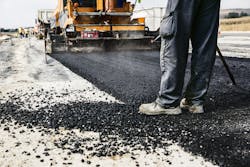Inflation hurting infrastructure projects as costs for supplies spike
Inflation costs are hurting infrastructure projects that have been planned across the United States. With prices up across the board, state and local officials are postponing projects, scaling back others, and reprioritizing their needs.
The price hikes already are diminishing the value of a $1 trillion infrastructure plan President Joe Biden signed into law just seven months ago. That law had included, among other things, a roughly 25% increase in regular highway program funding for states.
"Those dollars are essentially evaporating," said Jim Tymon, executive director of the American Association of State Highway and Transportation Officials (AASHTO). "The cost of those projects is going up by 20%, by 30%, and just wiping out that increase from the federal government that they were so excited about earlier in the year."
In Casper, Wyoming, officials are re-evaluating their options. The low bid to rebuild a major intersection and construct a new bridge over the North Platte River came in at $35 million this spring — 55% over a state engineer’s estimate.
"If this inflation keeps the way it is, we will have to roll projects from one year into the next, into the next, into the next," said Mark Gillett, chief engineer of the Wyoming Department of Transportation (WYDOT). "But it’s just not going to go as far as we had hoped," he said.
Prices for some key materials in infrastructure construction have risen even more. Prices paid to U.S. manufacturers of asphalt paving and tar mixtures were up 14% in May compared to last year, according to data from the Federal Reserve Bank of St. Louis. Prices for fabricated steel plate, used in bridges, were up 23%, and ductile iron pipes and fittings — used by water systems — were nearly 25% higher.
The hikes are being driven by a variety of factors, including worldwide supply-chain backlogs, strong consumer and business spending in the U.S., Russia’s invasion of Ukraine — and, some argue, federal energy and fiscal policies.
U.S. Rep. Sam Graves, the ranking minority member on the House Transportation and Infrastructure Committee, contends the infrastructure law itself is contributing to inflation by pouring more federal money into an economy already flush with trillions of dollars in federal pandemic aid.
"They are borrowing more money so they can spend more money, (which) is driving inflation, which is cutting down on the projects that they’re actually wanting to do," said Graves, a Missouri Republican who voted against the infrastructure bill.
White House senior adviser Mitch Landrieu said the infrastructure law "actually positions us for lowering costs for families in the short- and long-term." He pointed, among other things, to made-in America requirements for steel, iron and other construction materials that could strengthen supply chains and thus lower costs.
--------------------
Source: fox2detroit.com
